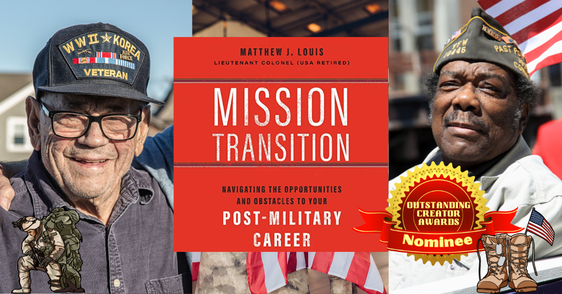|
Score: 95/100 (9.5 out of 10)
We really, really liked and enjoyed this book, and we really didn't expect to—at least to such a great extent. This book is so much more insightful, helpful, and practical than it initially appeared on the surface. Although this book is written for military veterans, every single person can take something away from it, even if it's just learning how to help or to understand the veterans in their lives. There are some great and surprisingly detailed tips in here about such things as finding references, applying for jobs, doing job interviews, finding housing, managing finances—things they really don't teach you in grade school and college. Ironically, a lot of soldiers become soldiers fresh out of grade school or college. The book is not shy about discussing the phenomenon in which soldiers will leave for deployment for years, only to return to a country and a world that has gone forward in time while they remain stuck in the past, even wearing the same clothes and using the same slang as when they left. This book really shines in the way that it views military veterans in not just a sympathetic, but an empathetic light. Soldiers are human beings who are often trained and conditioned to act, behave, and speak in a certain way—a way that's foreign to most civilians. They're human beings who've been programmed with a certain “on” switch. Yet, they're human beings nonetheless. They deserve our understanding and our help in transitioning back to civilian life and in learning when and how that “off switch” can be made available to them. This isn't so much a book about post-traumatic stress disorder (PTSD), although that may have been touched on here and there. It's really about practical, actionable advice on how veterans can better their lives and careers after military service. This is about putting aside the uniforms, the medals, the ranks, the formal addresses, and the life-or-death stress and learning to live as a civilian again. That's something we deeply appreciate as family and friends of multiple veterans of multiple wars. This is the kind of book that they and their families really need. It's just about the perfect how-to guide on how that transition can be made, smoothly, efficiently, and as pain-free as possible. It is very well-organized and structured. All the chapters seem to build upon each other, even referencing each other at times. It's also incredibly detailed, and not boorishly so. The details and quotes from veterans and inspirational people are all very fascinating and helpful, and they all seem to make rational sense. One of our favorite quotes from the book is a quote by John Adams stating that “Facts are stubborn things.” In other words, idealism doesn't take the place of reality and practicality. And that's perfect considering that we recently read a book about the Constitution that was completely enamored with the idealism of it all rather than the times when, well, things don't work out exactly as they should or as was planned. Hey, the best-laid plans usually don't survive first contact with the enemy. Murphy's law very often applies to. You need to plan and think about these sorts of things. And this book seems to think of everything. This is a book for veterans by a veteran, and it shows. We highly recommend this to veterans (and soon-to-be veterans) and their families! Check it out on Amazon!
0 Comments
Leave a Reply. |
Archives
July 2024
Categories |

 RSS Feed
RSS Feed